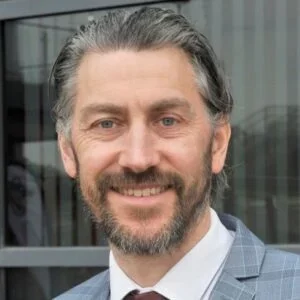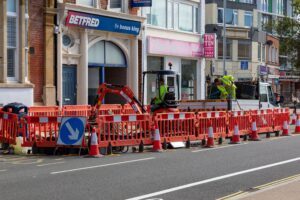The Head of SHE at CityFibre won the Most Influential category at the SHP Awards in December 2022. He speaks to SHP about his career to date and co-founding the Safety and Health in Fibre Telecoms (SHiFT) Group, which aims to set new industry standards within the full fibre sector.

Alan Trueman
Alan Trueman has been with CityFibre for two years, the UK’s largest independent full fibre platform. In that short time he has been commended for his contribution towards building a safety culture in a rapidly scaling business, evidenced further by recent RoSPA industry recognition. Alan has also played a key role in influencing how the fixed-line telecommunications sector can raise the bar when it comes to health and safety. It is for the latter that he won arguably SHP’s most prestigious award.
Recognised as the “main disruptor” in a fast changing market, CityFibre is at the forefront of a technological revolution that will see them roll out full fibre digital infrastructure to around a third of the country.
When Alan joined, most of the emerging organisations in the fibre industry worked to standards that had been around for a long time and had been developed from incumbent operators like BT Openreach. Even so, there were inconsistencies in approaches and no common rules or forums to share learning among operators.
Industry-wide standards
In a rapidly growing market, Alan says it is imperative to have industry-wide standards that are owned collectively by all fibre builders. This means building and improving on the existing standards to ensure they are fit for purpose for all operators and to deliver a consistent approach.
 The result was the Safety and Health in Fibre Telecoms (SHiFT) Group , which Alan chairs and helped to set up with Gavin Rae from BT Openreach and other proactive individuals from the industry in September 2021. Although the group doesn’t yet represent all operators in the market, they are all welcome to join and Alan says the key point is that the main players are represented.
The result was the Safety and Health in Fibre Telecoms (SHiFT) Group , which Alan chairs and helped to set up with Gavin Rae from BT Openreach and other proactive individuals from the industry in September 2021. Although the group doesn’t yet represent all operators in the market, they are all welcome to join and Alan says the key point is that the main players are represented.
“That’s really important to ensure the group has credibility and that when we do produce standards they are seen as a de-facto industry standard,” he says.
By the time this interview appears the group will have secured company limited by guarantee (CLG) status, which is really important because it means it can produce standards backed by some legal protection.
It helps that Alan was chair of a similar group in the mobile sector known as the Mast and Tower Safety Group from 2018-2020 and can bring this expertise to the table.
“That group had been going for some 15-20 years and they’ve done a great job of getting standards in place, but it’s taken a significant amount of time to get there,” he says. “However, they are the de-facto standards out there around work at height in mobile telecoms.”
“Building a community”
Alan recalls that when he first moved across to the fixed communications side, he was surprised that there wasn’t something similar in place.
“It seemed to me to be a no-brainer that the industry needed something like that, not only to generate the standards, but also there is a more intangible benefit, which is about building a community of like-minded people and safety professionals. It’s sometimes a lonely place being a safety professional in a fast-paced industry where there is quite a significant risk.”

This is an important point. One of the purposes of this group is to enable individuals to learn from their peers and share best practice.
“One of the first things we tried to get alignment on and agreement with when we set up as a group was service strike avoidance,” he says.
The pavements, roads and highways are already a heavily congested space with different industry providers, including water and gas, installing services. There is also the public to look out for and protect.
“While there are some standards in place for the depth that things should be buried and laterally where they should be, it is guidance only,” he explains.
“A lot of previous operators may not have worked to those standards, so with us coming along and digging up the pavements to put fibre in the ground, there are some real risks associated with that.”
To minimise the risk of strikes, Alan and the group have done a lot of work around operational performance, most notably establishing an industry strike rate so the group’s members can benchmark what they do against industry peers.
“From there we can start to determine if our performance is where it needs to be and drive standards by putting further controls in place,” he explains. “knowing how we are doing against a benchmark is really important if you are going into a boardroom and talking about performance.”
“Disparity” in health and safety
Another challenge for the sector is the stiff competition for its highly-skilled telecommunications engineers. It’s another reason why the SHiFT Group was set up in the first place, he says.
 “There is a lot of migration among organisations and individuals working for different clients. Therefore there was a need to get some standardisation given that an individual or gang could be working for one company one day and a different client organisation the next,” he explains. “Disparity in respect to standards can lead to unsafe situations.”
“There is a lot of migration among organisations and individuals working for different clients. Therefore there was a need to get some standardisation given that an individual or gang could be working for one company one day and a different client organisation the next,” he explains. “Disparity in respect to standards can lead to unsafe situations.”
Alan has seen a lot of disparity in health and safety throughout his OSH journey. He left school at 16 in 1995 and took up a mechanical engineering apprenticeship in a factory in Nottingham where he worked for six years. Health and safety was non-existent and he was expected to operate heavy presses and machine tools with very little training. An older worker kept an eye on him and inadvertently pointed him to an OSH career.
“He’d regularly pull me to one side and say, ‘This isn’t how a work environment should be. You need to get out of here’. He started talking about safety as a career.”
Alan secured an apprenticeship as a health and safety manager with Eve Telecom in March 2001 and stayed with the firm for the next seven years, working at the forefront of the emerging mobile telecommunications’ sector.
He ended up joining Arqiva in 2008 where he supported projects which involved work at height on the large towers that support TV and radio antennae. Alan remained with the business for 13 years before moving sideways to the fixed telecommunications industry when he took up his current post in April 2021.
A great career
One of the things Alan really likes about his chosen career is that no two days are the same. “Generally as a profession, OSH has so much to offer in that respect,” he says. “If you like getting involved in a range of different things, it’s a great career.”
He particularly likes getting involved in the critical or potentially catastrophic risk areas as this is “where I feel there is significant material risk and where I can do my deep work”.
Alan has generated a real interest in psychology and is currently studying an MSc in organisational psychology. The course has explored some thought-provoking areas, for example, how certain personalities might influence risk-taking behaviour. It’s another reason why he sees the SHiFT group bringing value to the industry.
“I am really keen that we become more visible to the doers,” he says. “I want to ensure that the work we are doing is shared with those who really need it; the operatives out in the street.”
Winners and judges of the SHP Awards 2022 have been invited to attend this year’s Safety & Expo in May. Get your free ticket now!
The Safety Conversation Podcast: Listen now!
The Safety Conversation with SHP (previously the Safety and Health Podcast) aims to bring you the latest news, insights and legislation updates in the form of interviews, discussions and panel debates from leading figures within the profession.
Find us on Apple Podcasts, Spotify and Google Podcasts, subscribe and join the conversation today!


 The result was the Safety and Health in Fibre Telecoms
The result was the Safety and Health in Fibre Telecoms 
 “There is a lot of migration among organisations and individuals working for different clients. Therefore there was a need to get some standardisation given that an individual or gang could be working for one company one day and a different client organisation the next,” he explains. “Disparity in respect to standards can lead to unsafe situations.”
“There is a lot of migration among organisations and individuals working for different clients. Therefore there was a need to get some standardisation given that an individual or gang could be working for one company one day and a different client organisation the next,” he explains. “Disparity in respect to standards can lead to unsafe situations.”